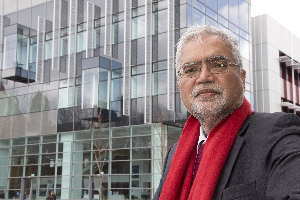Former UN chief debates genocide
10 Apr 2013
A former United Nations (UN) chief and University Professor, who let the world know about genocide in Darfur, is taking part in a public debate entitled: Getting away with murder: genocide and politics, in Manchester next week (15 April).

Professor Mukesh Kapila, Professor of Global Health and Humanitarian Affairs, whose book Against A Tide of Evil documents his time as the head of the United Nations in Africa’s largest state, is calling for more to be done to help the situation in Syria.
He said: “We have more than a million refugees and more than 2.5million internally displaced. Gross violations of human rights are occurring and there is a severe shortage of humanitarian assistance.”
Professor Kapila joined the University’s Humanitarian Conflict Response Institute as Professor of Global Health and Humanitarian Affairs last year and now teaches on the postgraduate course in Humanitarian and Conflict Studies and undergraduate degree courses in Global Health. He is also part of the Manchester Academic Health Sciences Centre (MAHSC), a partnership between the University and six NHS Trusts in Greater Manchester, where he advises on global health development and how health workers can support medics coping with natural and humanitarian disasters overseas.
After a career in medicine and public health where he helped set up the UK’s first national HIV and AIDS programme at the Health Education Authority, Professor Kapila joined the UK Foreign and Commonwealth Office’s Overseas Development Administration. He went on to become Special Adviser to the UN High Commissioner for Human Rights in Geneva and Head of the UN in Sudan.
A veteran of humanitarian crises and ethnic cleansing in Iraq, Rwanda, Srebrenica and Sierra Leone, in 2003 he blew the whistle on the genocide taking place in Darfur revealing how mass murder and ethnic cleansing were being perpetrated. He has received a CBE for his international service and the Global Citizenship Award of the Institute for Global Leadership. He has also been Under Secretary General at the International Federation of Red Cross and Red Crescent Societies, the world's largest humanitarian and development network.
Professor Kapila said he hoped his role at Manchester and his book would help to raise awareness and help prevent further human suffering. “My book has grown out of my experiences over the last 20 years culminating in my biggest and hardest test as Head of the United Nations in Sudan witnessing the first genocide of the 21st century – the worst crimes against humanity,” he said. “When I found myself in charge instead of just a general medic on the ground it was a real test of my values and convictions as well as my position. The story is about the challenges and problems I faced in confronting this vile genocide - especially having just said after Rwanda in 1994 never again on my watch. It documents the limitations and disappointments of the international system, governments and the UN in not being able to stop it
“I want to get my story and experience out to a new generation so they can understand the atrocities in Darfur and Rwanda. This can never be forgotten.”
To attend the debate, visit:
